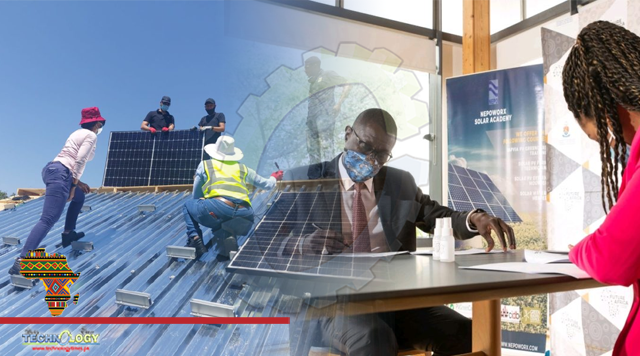A solar photovoltaic (PV) green skills, enterprise development and sustainability research programme will be implemented by Future Africa (at the University of Pretoria) and Nepoworx, after the two signed a Memorandum of Understanding (MOU) this month.

The objective of the programme is to upskill a total of 900 youth, women and entrepreneurs over the next three years ensuring their participation in the green economy and more importantly, forming part of the just energy transition that is currently unfolding in South Africa.
Professor Cheikh Mbow, director for Future Africa at the University of Pretoria, said: “The MOU signed with Nepoworx is a milestone towards robust engagement with like-minded enterprises for sustainable development pathways that build on Africa’s best asset, which is renewable energy.”
The green skills being developed are important in contributing towards the alleviation of the triple challenges of the continent that are: unemployment, inequality and energy supply.
The programme will encompass a workplace component, which is critical in ensuring that the participants gain the requisite hands-on experience needed to increase their chances of securing employment in the renewable energy sector.
The promotion of solar energy in Africa is a strong option for decarbonising the development of the continent.
Nonjabulo Sokhela, CEO of Nepoworx, said: “The programme aligns with Nepoworx’s mission which seeks to develop green skills and transform the renewable energy sector in Africa by partnering and leveraging the skills and expertise from both the public and private sectors. Overall, we believe this initiative will be a game changer and we are looking forward to our partnership with Future Africa.”
Future Africa and Nepoworx are targeting several partners including commercial banks and multilateral Development Finance Institutions, renewable energy associations and Independent Power Producers (IPPs) to ensure its successful implementation.
The key drivers which led to this initiative include the green PV skills needed to successfully implement the renewable energy build programmes across the continent and more specifically the Renewable Energy Independent Power Producers Programme (REIPPP) in South Africa.
“It is important that we develop the local green skills necessary to contribute to the implementation of the ambitious renewable energy targets under the Integrated Resource Plan (IRP) 2019, to support various policy frameworks such as the Paris Agreement and the Nationally Determined Contributions (NDCs)”, notes Sokhela.
Originally published at Esi-Africa